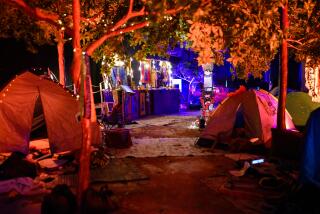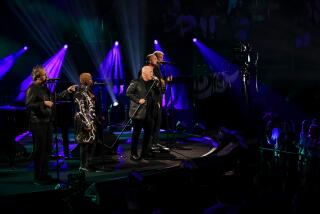Amnesty International concerts captured on ‘Released!’ DVDs, CDs
It’s almost inconceivable today, but a generation ago, some of the biggest pop music events in the history of the planet came and went with no commercially available evidence left behind.
That curious fact is brought to the fore with this week’s first-ever home video release of “¡Released!” -- separate DVD and CD sets highlighting performances from four-star-packed Amnesty International concerts and tours that sprang up from 1986 to 1998. Those events brought out high-profile supporters including Bruce Springsteen, Sting, U2, Peter Gabriel, Lou Reed, Joni Mitchell, Joan Baez, Miles Davis, Sinead O’Connor, Jimmy Page, Robert Plant and many more.
There was, however, a pragmatic reason behind the absence of home video versions after the concerts that raised money and awareness for Amnesty International’s efforts to free political prisoners.
PHOTOS: Iconic rock guitars and their owners
The blueprint was established by Bob Geldof as he assembled Live Aid, the massive benefit for African famine relief in 1985. It would have been a nightmare of contract negotiations to get approval from varying -- and competing -- business interests representing all the participants at that mega-show, so Geldof assured all the artists that their performances would never be packaged for commercial release. It would also enhance the uniqueness of the public event.
When Amnesty officials put together the “A Conspiracy of Hope” tour in 1986, they followed the template set by Live Aid, which received an overwhelmingly positive response among the musical community and the public at large.
Flash forward a couple of decades, and new forums — YouTube and other websites — have created a situation where primitive home recordings from the original broadcasts are uploaded for public consumption, with little attention to quality and no payoff for the intended beneficiaries.
PHOTOS: Daughters of rock stars
Those realities prompted Geldof to rethink his position and, in 2004, he led the campaign that yielded a four-DVD set of “Live Aid” performance highlights aimed at generating more money for famine relief.
Likewise, net proceeds from sales of the six-DVD and two-CD “¡Released!” sets will add more to the coffers at Amnesty International. The DVD set, with 12 hours of performance footage, also promises to add more historical perspective on Amnesty’s intersection with the pop music community through nearly five additional hours of supplemental features including recently conducted interviews with Springsteen, Sting, Bono, Gabriel, the Who’s Pete Townshend and others.
“The release of this material now isn’t just a case of better quality of what you already have. These have not been seen since the first time they aired live,” said “¡Released!” project producer Martin Lewis, co-creator of the “Secret Policeman’s Ball” benefit series in the 1970s and 1980s, which featured Pete Townshend, Sting, Bob Geldof and others and who instigated Amnesty’s outreach to the rock community.
PHOTOS: Unexpected musical collaborations
Lewis sifted through all the concert footage and culled it down to 17 hours over six DVDs. “What jumps out for me are the collaborations: Bono with the Police, Bruce Springsteen with Sting singing ‘Every Breath You Take’ and Sting and Bruce doing ‘The River,’ ” he said. “You see the camaraderie that underscores why they were doing it.”
Lewis largely credits Jack Healey, director of Amnesty International USA for a dozen years, for bringing the events to reality.
“Jack Healey is one of the undersung heroes,” Lewis said. “He thought up the 1986 U.S. tour with rock and pop stars on the road to benefit Amnesty. Subsequently he and I came up with the idea of the 1988 world tour over a long lunch at the Sunset Marquis. But I genuinely never thought it would happen. Imagine doing something like Live Aid for six weeks all around the world, with all those managers and heavyweight artists. But he produced that tour and made it happen.”
Amnesty International staged tours in 1986 and 1988, and one-off concerts in 1990. After Healey left Amnesty in the early 1990s, the series extended with The Struggle Continues..., a concert held in Paris in 1998.
A big reason for the concerts’ success is that so many members of the music community passionately supported Amnesty’s mission, and lobbied their friends and colleagues to join.
“It’s ’86 that I got properly connected,” Gabriel said in one of the interviews that is part of the DVD set, which also includes some of his home movies from that year’s tour. “I’d done the ‘Secret Policeman’s Ball’ before then, but I got the hustling call from Bono to join the ‘Conspiracy of Hope’ tour going around America…. I ended up getting asked to help with the ’88 tour, which was to go around the world: Human Rights Now! I ended up doing Bono’s hustling job, and got Sting and Youssou and eventually Springsteen to come on board.”
Bono, who has described his and U2’s involvement with Amnesty as “a lifetime thing,” said, “What I really like about it is that simple action that can join you to somebody. I love the efficiency of just writing a single postcard. You connect yourself with another soul, another sentient being…. And in that moment there begins a really powerful relationship.”
RELATED: Best albums of 2013 so far | Randall Roberts
While the ‘80s Amnesty shows reflected considerable crossover with the Live Aid participants, by the time the 1998 show took place, new generation musicians were joining. The Struggle Continues… featured Radiohead and Alanis Morissette along with Springsteen, Gabriel and others.
“It’s that little acorn thing,” Lewis said, reflecting on the humble beginnings of the Amnesty benefits as comedy shows featuring members of Monty Python and other comics, before Pete Townshend showed up in 1979 and added music to the mix.
“I remember that very first show with John Cleese and his mates. He said, ‘Let me call up a few pals.’ And then I thought about sitting in the Coliseum in L.A. in 1988, and I sat with Peter Gabriel in his dressing room. He said, ‘Look what you started.’ I said, ‘It was what John Cleese started.’ We’ve all had a part. This thing keeps getting passed forward. Who knows what will happen now?
“My hope,” Lewis added, “is that younger artists look at what they did, and reach the conclusion that ‘I’ve got to do my bit now.’ Then we’ll be fine.”
Above, watch a clip of Bruce Springsteen talking about his Amnesty performance in Zimbabwe in 1988 when most pop musicians were boycotting South Africa because of apartheid (Springsteen recently announced that he’ll perform in South Africa for the first time in January).
More detailed information about the history of the Amnesty concerts is available at this Human Rights Concerts web site.
ALSO:
Bob Dylan tribute album honors Amnesty International too
Amnesty International benefit concerts coming to DVD/CD on Nov. 5
Follow Randy Lewis on Twitter: @RandyLewis2
More to Read
The biggest entertainment stories
Get our big stories about Hollywood, film, television, music, arts, culture and more right in your inbox as soon as they publish.
You may occasionally receive promotional content from the Los Angeles Times.










